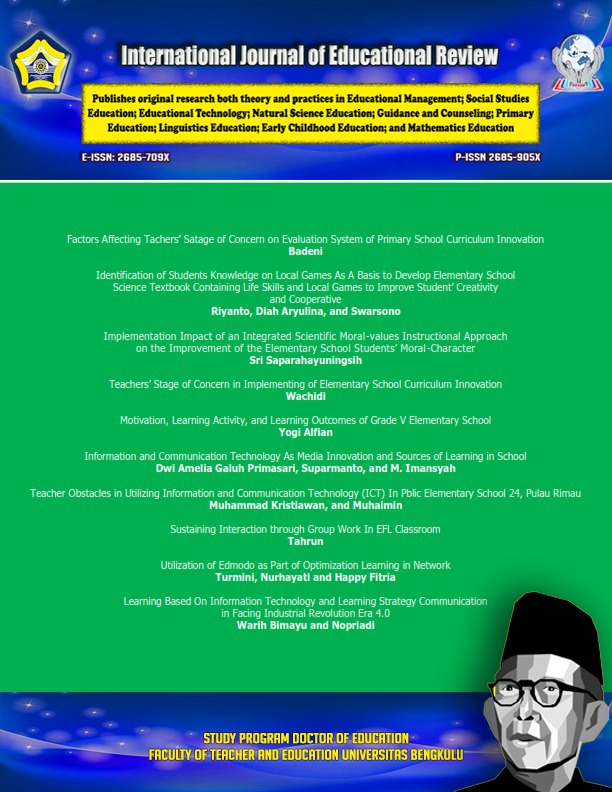Lecturer Professionalism in Improving The Effectiveness of Higher Education Institutions
DOI:
https://doi.org/10.33369/ijer.v4i1.22406Keywords:
Organizational Effectiveness, Lecturer’s Professionalism, Quality Improvement,Abstract
Purpose: Researchers have tried to conduct analytic studies on IAI Tebo Jambi to analyze lecturer professionality in improving organizational effectiveness. Methodology: The study used qualitative design with survey approaches. As a source of informants, the study involved 3 managing—lectures as well as employees plus students through purposive sampling. Data collection is done through the results of interviews, observations and documentation. Main Findings: The limits of area research selected for this study reflected the competence of lecturers into fundamental aspects in the learning process thus impacting the quality of graduates. As the newly transformed college from high school to institute demands strategy in HR governance system and fulfillment of college resource standards. Applications The practical implications when the quality of management education is enriched, it will create global management professionals who will contribute qualitatively to industry and lift global economic development as a whole. Novelty/Originality The process of IAI Tebo Lectures professional development with four steps, First, interested stakeholders, workers organization society; Second Competencies according to knowledge, skills, and attitudes. Third, the barriers and propulsors with contextual elements, personal characteristics and relational elements. And the fourth stakes of development with Early career, Career in consolidation, and Consolidated career.
References
Arfani, J. W., & Nakaya, A. (2019). Meanings of International High School Education in Indonesia and Japan. Journal of Research in International Education, 18(3), 310–325. https://doi.org/10.1177/1475240919890223
bangkapos.com. (2021). Menjaga Integritas Profesionalisme Guru. Bangkapos.Com. https://bangka.tribunnews.com/2022/03/24/menjaga-integritas-profesionalisme-guru.
Bashori, B., Prasetyo, M. A. M., & Susanto, E. (2020). Change Management Transformation in Islamic Education of Indonesia. Social Work and Education, 7(1), 72–85.
Ekasari, S., Orba Manullang, S., Wahab Syakhrani, A., & Amin, H. (2021). Understanding Islamic Education Management in Digital Era: What Experts Say. Nidhomul Haq : Jurnal Manajemen Pendidikan Islam, 6(1), 127–143. https://doi.org/10.31538/ndh.v6i1.1336
Emzir, A. D. (2011). Metodologi Penelitian Kualitatif. Jakarta: Rajawali Pers.
Fajri, M. R., & Sukatin, S. (2021). Budaya Organisasi dalam Menciptakan Daya Saing Menuju Sustainabilitas Perguruan Tinggi. Idarah (Jurnal Pendidikan Dan Kependidikan), 5(1), 1–16. https://doi.org/10.47766/idarah.v5i1.1442
Fayolle, A., & Redford, D. T. (2014). Handbook on the Entrepreneurial University (Elgar Original Reference) Research Handbooks in Bussiness and Management. Elgar Online.
Ilham, M., Islami, N., Abdurrahman, F., & Suryadi, S. (2021). E-aedes Framework based on Geographical Information System: Stakeholder Perceptions. Journal of Multidisciplinary Academic, 4(6), 453–456.
Kremen, V. (2013). Education in the Structure of Civilization Changes.
Martyakova, E., & Gorchakova, E. (2019). Quality Education and Digitalization of the Economy. International Conference on the Industry 4.0 Model for Advanced Manufacturing, 212–218.
Milles, M. B., & Huberman, A. M. (1994). Qualitative Data Analysis. Sage Publication.
Mkrttchian, V., & Belyanina, L. (2018). Handbook of Research on Students’ Research Competence in Modern Educational Contexts. IGI Global.
Prasetyo, M. A. M., Anwar, K., Asvio, N., & M, Z. (2022). Dimensional Analysis of School Based Pesantren Design Development. 7(1), 1–13. https://doi.org/10.25217/ji.v7i1.1636
Prasetyo, M. A. M., & Husaini, H. (2021). Efektivitas Pengelolaan Mutu Dosen Perguruan Tinggi Agama Islam Negeri. IMPROVEMENT Jurnal Ilmiah Untuk Peningkatan Mutu Manajemen Pendidikan, 8(1), 29–39. https://doi.org/10.21009/Improvement.081.03
Prasetyo, M. A. M., & Sukatin, S. (2020). Nilai Strategis dalam Meningkatkan Competitive Value Perguruan Tinggi Agama Islam Swasta di Provinsi Jambi. Idarah (Jurnal Pendidikan Dan Kependidikan), 4(2), 121–134. https://doi.org/10.47766/idarah.v4i2.1037
Rahmah, S., & Fadhli, M. (2021). Character Education in Islamic Education Institutions: A Study on the Impact of Lecturer Competence at IAIN Lhokseumawe. MIQOT: Jurnal Ilmu-Ilmu Keislaman, 45(1), 87. https://doi.org/10.30821/miqot.v45i1.771
Robbins, S. P. (2010). Organizational Behavior: Concepts, Controversies, and Applications. Prentice Hall International.
Robbins, S. P., Judge, T. A., & Shobirin, A. (2014). Perilaku Organisasi (10th ed.). Salemba Empat.
Rodliyah, S. (2019). Leadership Pesantren: Urgensi Pendidikan dalam Menyiapkan Pemimpin Bangsa Berkualitas dan Bermoral. Manageria: Jurnal Manajemen Pendidikan Islam, 4(1), 169–182. https://doi.org/10.14421/manageria.2019.41-10
Steve Giegerich. (2019). Education Policy Preparing for Jobs, Citizenship and Life. Tachers College Columbia University. https://www.tc.columbia.edu/articles/2019/january/schools-of-choice-it-can-depend-on-whos-choosing/
Taylor, S. J., Bogdan, R., & DeVault, M. (2015). Introduction to Qualitative Research Methods: A Guidebook and Resource. John Wiley & Sons.
Wajdi, M. B. N. (2016). Metamorfosa Perguruan Tinggi Agama Islam. AT-Tahdzib: Jurnal Studi Islam Dan Muamalah, 4(1), 92–109.
Wiek, A., Withycombe, L., & Redman, C. L. (2011). Key Competencies in Sustainability: a Reference Framework for Academic Program Development. Sustainability Science, 6(2), 203–218. https://doi.org/10.1007/s11625-011-0132-6
Downloads
Published
How to Cite
Issue
Section
License

This work is licensed under a Creative Commons Attribution-ShareAlike 4.0 International License.




